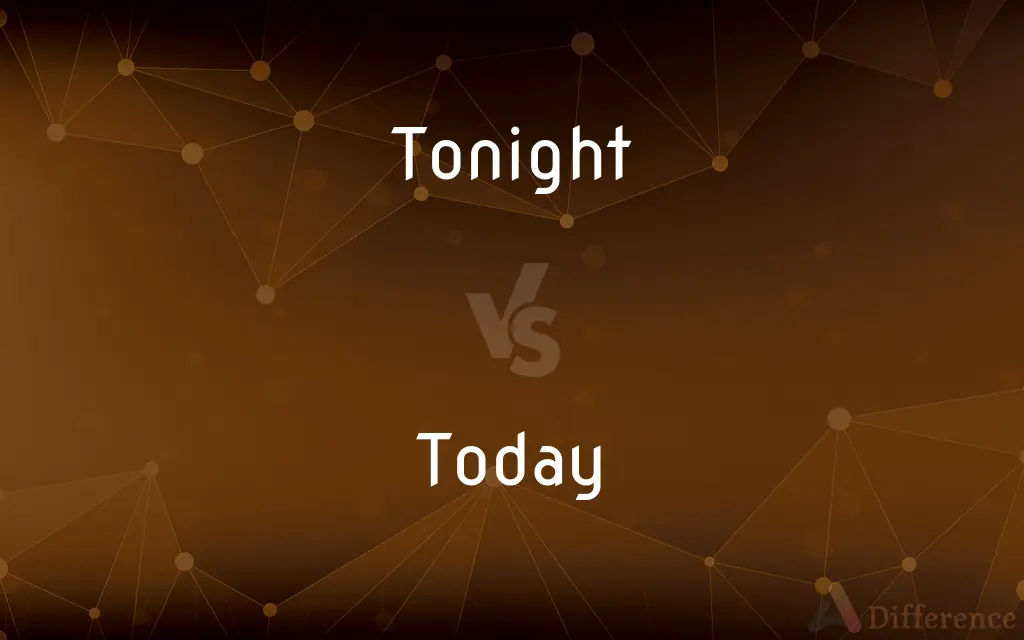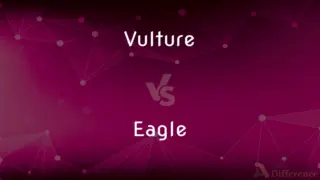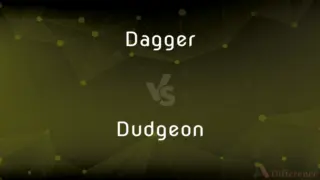Tonight vs. Today — What's the Difference?
Edited by Tayyaba Rehman — By Fiza Rafique — Updated on March 24, 2024
"Tonight" refers to the evening or nighttime portion of the current day, focusing on activities or events after dusk, whereas "today" encompasses the entire current day from midnight to midnight.

Difference Between Tonight and Today
Table of Contents
ADVERTISEMENT
Key Differences
"Tonight" specifically denotes the time period of the current day that occurs during the evening and night, implying activities or plans that take place after sunset. On the other hand, "today" refers to the entire span of the current 24-hour day, starting from midnight, covering all dayparts including morning, afternoon, evening, and night.
When planning events or meetings, "tonight" is used to suggest a gathering or activity that will occur in the later part of the day. Whereas "today" is used when the specific time of the day is flexible or encompasses the whole day, from the early hours of the morning to late at night.
In daily communication, "tonight" often carries a connotation of relaxation or leisure activities, as it falls outside of standard working or school hours for most people. Conversely, "today" can encompass a wide range of activities, responsibilities, and moods, depending on the context and the hour it's being referred to.
The use of "tonight" is particularly common in contexts related to entertainment, dining, and socializing, reflecting the cultural association of night with leisure. On the other hand, "today" is a more neutral term that can refer to any type of activity or obligation within the current day.
Weather forecasts also differentiate between "tonight" and "today," with the former focusing on overnight conditions and the latter covering daytime weather. This distinction helps in planning daily activities and understanding how weather changes might affect them.
ADVERTISEMENT
Comparison Chart
Time Frame
Evening and night of the current day
Entire span of the current day, 24 hours
Common Usage
Leisure, social events, relaxation
Broad, includes work, appointments, daily tasks
Connotation
Often associated with relaxation and leisure
Neutral, varies with context
Planning Context
Specific to evening or night activities
Any time of the day, more general
Weather Forecasting
Focuses on overnight conditions
Covers daytime weather conditions
Compare with Definitions
Tonight
"Tonight" refers to the evening part of the current day.
We're going to the movies tonight.
Today
"Today" encompasses the full 24 hours of the current day.
I have a busy schedule today.
Tonight
It often implies plans or activities after dark.
The festival lights up the city skyline tonight.
Today
It is used for events or tasks at any time during the day.
We need to submit the report by today.
Tonight
This term is used when inviting someone for an evening event.
Are you free for dinner tonight?
Today
"Today" can reflect the current state or mood.
The weather today is perfect for a picnic.
Tonight
"Tonight" can denote a specific time for television shows or events.
The season finale airs tonight at 8 PM.
Today
This term is common in daily planning and appointments.
My doctor's appointment is scheduled for today.
Tonight
"Tonight" is associated with nighttime leisure activities.
The band's performance tonight is highly anticipated.
Today
"Today" is used in news and media to denote current events.
Today's headlines focus on the economic summit.
Tonight
On or during the present or coming night.
Today
On or in the course of this present day
He will appear in court today
She's thirty today
Tonight
This night or the night of this day.
Today
This present day
Today is a rest day
Today's match against United
Tonight
During the night following the current day.
I want to party tonight!
I had a wonderful time with you tonight.
Today
The present day, time, or age
"Today's shocks are tomorrow's conventions" (Carolyn Heilbrun).
Tonight
(obsolete) Last night.
Today
During or on the present day.
Tonight
The nighttime of the current day or date; this night.
Tonight is the night.
I have high hopes for tonight.
Today
During or at the present time.
Tonight
On this present or coming night.
Today
Concerned with or relating to the present time
Today issues.
The today generation.
Tonight
On the last night past.
Today
On the current day or date.
I want this done today.
Today, my brother went to the shops.
Tonight
The present or the coming night; the night after the present day.
Today
In the current era; nowadays.
In the 1500s, people had to do things by hand, but today we have electric can openers.
Tonight
The present or immediately coming night
Today
A current day or date.
Today is the day we'll fix this once and for all.
The youth of today have never known what life is like without a cell phone.
Tonight
During the night of the present day;
Drop by tonight
Today
From 6am to 6pm on the current day.
Today
The present time period; nowadays.
Today
(informal) Current; up to date.
Today
The present time or age;
The world of today
Today we have computers
Today
The day that includes the present moment (as opposed to yesterday or tomorrow);
Today is beautiful
Did you see today's newspaper?
Today
In these times;
It is solely by their language that the upper classes nowadays are distinguished
We now rarely see horse-drawn vehicles on city streets
Today almost every home has television
Today
On this day as distinct from yesterday or tomorrow;
I can't meet with you today
Common Curiosities
Can "tonight" include late-night hours?
Yes, "tonight" includes both the evening and the late-night hours until midnight.
Is "today" used for future planning?
"Today" can be used for immediate planning within the current 24-hour day.
What does "tonight" mean?
"Tonight" refers to the evening and nighttime hours of the current day.
Can "tonight" refer to early evening activities?
Yes, "tonight" can refer to activities occurring in the early evening or any time after sunset.
How do weather forecasts use "tonight" and "today"?
Weather forecasts use "tonight" for overnight conditions and "today" for daytime weather.
How do children understand "tonight" vs. "today"?
Children learn to differentiate "tonight" as evening time and "today" as the current day through daily language use and context.
How is "today" different from "tonight"?
"Today" covers the entire current day, while "tonight" specifically refers to the evening and night portion.
Are "tonight" and "today" used differently in business contexts?
In business, "today" is more common for general planning, while "tonight" might be used for after-hours events or deadlines.
Do digital devices use "tonight" for reminders or alerts?
Digital devices might use "tonight" for reminders about events or tasks occurring in the evening.
Can "tonight" be ambiguous in meaning?
"Tonight" is generally clear but can be ambiguous near midnight or when discussing events happening very late at night.
How is "today" used in expressions of urgency?
"Today" is used in expressions of urgency to emphasize the need for immediate action within the current day.
Can "tonight" be used to describe past events?
"Tonight" is typically used for the current day, but in storytelling, it can be used to describe past events happening during an evening.
Does the meaning of "today" change during the day?
The general meaning of "today" remains the same, but its context might shift based on the specific time it's referenced.
How do cultural differences affect the use of "tonight"?
Cultural norms around evening activities can influence what types of events are associated with "tonight."
Is "tonight" used in all English-speaking countries?
Yes, "tonight" is used in English-speaking countries, but the specifics of evening activities may vary culturally.
Share Your Discovery

Previous Comparison
Vulture vs. Eagle
Next Comparison
Dagger vs. DudgeonAuthor Spotlight
Written by
Fiza RafiqueFiza Rafique is a skilled content writer at AskDifference.com, where she meticulously refines and enhances written pieces. Drawing from her vast editorial expertise, Fiza ensures clarity, accuracy, and precision in every article. Passionate about language, she continually seeks to elevate the quality of content for readers worldwide.
Edited by
Tayyaba RehmanTayyaba Rehman is a distinguished writer, currently serving as a primary contributor to askdifference.com. As a researcher in semantics and etymology, Tayyaba's passion for the complexity of languages and their distinctions has found a perfect home on the platform. Tayyaba delves into the intricacies of language, distinguishing between commonly confused words and phrases, thereby providing clarity for readers worldwide.














































